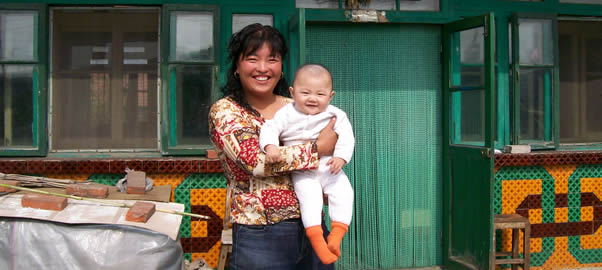Grassroots Democracy, Chinese Style
Lesson Four in Snow's Job in China
Oct. 16, 2007
by Nancy Snow
Nancy Snow, associate professor of communications, is a visiting senior scholar and professor in Beijing, China, through November. She is teaching a graduate course in public diplomacy at Tsinghua University’s School of Journalism and Communication, as well as working on joint research projects with Chinese faculty. While overseas, she will be sharing her experiences.
Lesson Four: When in China, leave the city.
If you want to know China, then don’t ever limit yourself to just visiting well-known destinations like Beijing, Shanghai, or the Guangdong Province cities of Hong Kong and Macau. These are fascinating world-class cities of millions, but they don’t reveal the whole picture about a country where 80 to 90 percent of its people reside in the rural areas.
It would be like going to the United States and visiting Los Angeles, New York and Washington, D.C. One could not call that all of America. For one, you would miss my beloved Deep South and the best homemade barbecue with all the fixings in the world. Vegetarians beware. And any foreign visitor to the U.S. must travel the blue highways in rural Vermont, New Hampshire or Maine to fully appreciate our country’s great beauty and diversity in lifestyle.
Perhaps it is because I’ve experienced many years of living in a small college town of 1,700 (Henniker, New Hampshire) and metropolitan area of 10 million (Los Angeles County) that I like to know about the full picture of a place.
I had the privilege of spending a day with the residents of Jing Er Tun, a small village of 2,700 in Liaoning Province not far from the provincial capital of Shenyang in Northeast China.
Those who live there might be classified as China’s poor, but that characterization is a bit misleading because I learned a lot about appreciating simple gifts of life that make their lives richer. These include love of family and working hard each day to provide for one’s children and community.
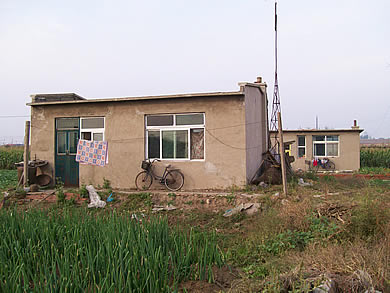
House in Jing Er Tun
Dean Xiguang Li of the School of Journalism and Communication invited me to his ancestral home. I met a number of Li’s relatives and stood on the grounds where his father’s birth home had once stood (the original house was replaced).
I enjoyed a delicious village lunch where I was treated to a number of local favorites, including a popcorn quesadilla. I’m sure that isn’t its actual name, but it consisted of freshly shucked kernels of corn deep fried in a delicious dough and served like a pizza slice. It’s not the healthy choice given the deep frying part, but it was quite tasty and my Jing Er Tun friends ordered me another plate when they saw how much I enjoyed my first bite. (Warning: Remember to point at your tummy and say that you are full at all times or your Chinese hosts might just order you several more dishes).
A fascinating part of our day’s visit was visiting the local council building for Jing Er Tun. I was introduced to the village leader and his deputy leader. The village leaders were very proud of the positive changes they had made for the village, including paving the roads, providing street lamps and constructing a children’s playground, all on donations from the villagers.
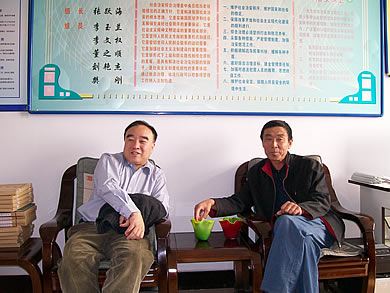
Xiguang Li, left, and the village mayor
The village was a living example of grassroots democracy in China. These are people making collective decisions and holding elections for the town council board. I couldn’t believe my eyes.
The village leader, Mr. Mayor, offered me a cigarette during our introduction. I got the sense that this was a part of being a good host and I politely declined. Later, I asked Dean Li about the amount of smoking I was seeing, particularly among the male farmers. He said that it’s not uncommon for these farmers to spend one-third of their income on cigarettes. My worry is that the farmers work so hard and put in such long hours, probably 12-15 hours per day among many. Should they develop smoking-related illnesses, their families’ income could be jeopardized.
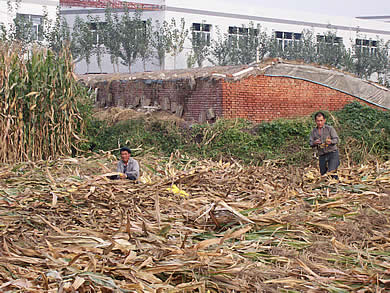
Farmers working in a cornfield
I visited the family home of one of Li’s cousins. He and his wife have a chicken farm and every day the husband collects one thousand eggs from the chickens that the wife sells at the local market. Their one son, of whom they are naturally proud, is off at university. All their income goes toward his tuition.
I took a picture inside the chicken farm but it’s a bit dark. The smell was not likely marketable. I also took pictures of the countryside. One picture that struck me was of two farmers working in the cornfields with a new industrial building in the background. Old China meets New China, everywhere you look.
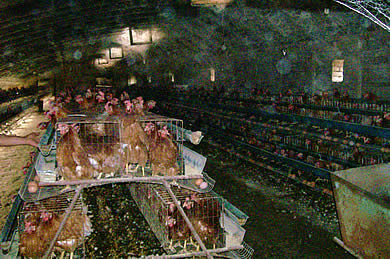
Chicken Farm
At one point, while we were waiting for a taxi after visiting the chicken farm, police descended on a small store front and arrested the owner in front of my eyes. There was illegal gambling going on inside the store. China prohibits gambling, except for designated areas like Macau. A lot of the villagers had gathered outside to watch all the excitement. It was quite an adrenaline rush to see the storeowner being whisked away by the local police.
I told the villagers of Jing Er Tun that I would blog about their nice village. I’ll never forget the smiling faces of the mother and baby who greeted me at one of the homes I visited. People-to-people, one smile and one person at a time, we can change this world for the better.
Nancy Snow’s e-mail is nsnow@fullerton.edu
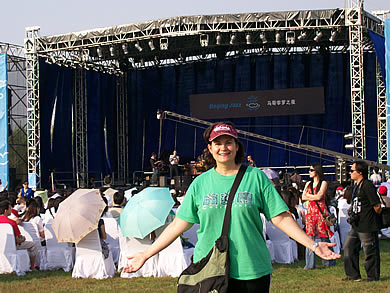
Nancy Snow at the Beijing Jazz Festival

